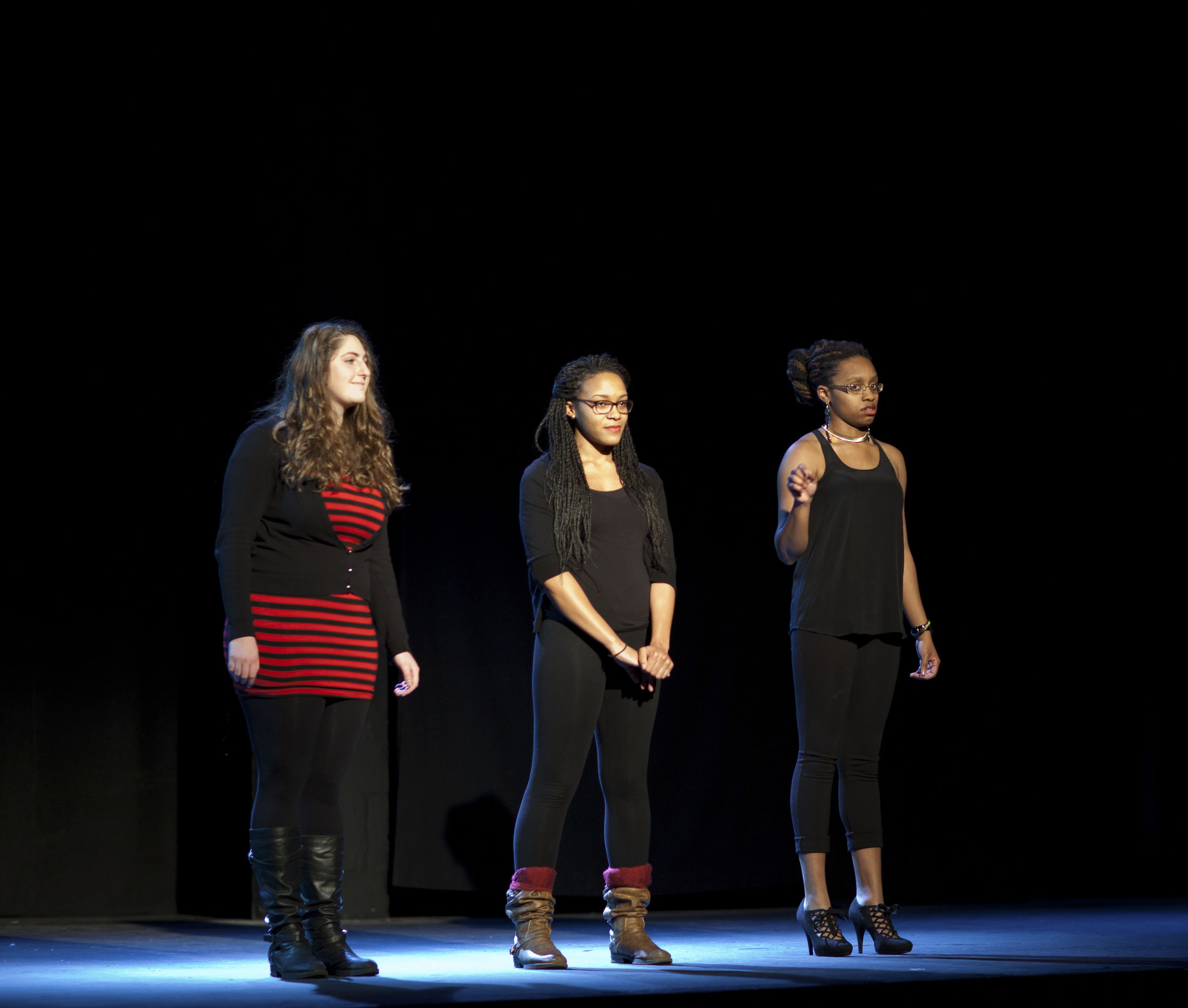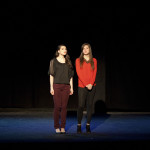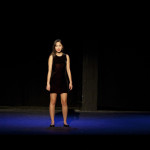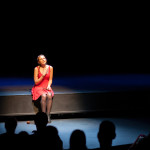By Arielle Lipset, Assistant Campus Life Editor
The Vagina Monologues, a play by Tony-award-winner Eve Ensler, offers conversation about vaginas that is hard to find elsewhere. Since the show’s premiere in 1996, it has been touching audiences around the world with stories of sexual exploration, assault, and empowerment. This past weekend, student directors Marienil Aquino ’16, Cecilia Plaza ’17, and Brianna Robinson ’16 brought the production to the Green Room Theatre for the 10th consecutive year.
The show is composed of a series of monologues, each discussing a different feminine experience drawn from interviews Ensler conducted with more than 200 women. Subjects range from a young girl’s confrontation with her first menstruation to testimonies of victims of rape and assault.
The show’s controversial themes ultimately convey a message of female empowerment, rooted in female sexuality. In addition to writing the play, Ensler also founded V-Day, a global movement aimed at ending violence against women by using creative events to spread broader awareness of the issues such as rape, battery, incest, female genital mutilation, and sex slavery throughout the world. Performances of The Vagina Monologues are intended to raise awareness and funds for V-Day’s mission and causes.
However serious the issues the play covers, it also achieves a comical and delightful portrayal of womanhood. Of course, violence against women cannot be taken lightly, and F&M directors, as well as cast members, took the themes very seriously.
“It’s really important that the people of the F&M community see this show and maybe see themselves in the show,” Robinson said. “While we must understand that not all the content is relatable, there are crucial parts that do apply to our campus. I hope that the audience can take away the message and understand its relevance.”
Aquino agreed, and hopes the play’s message will reach a wide audience.
“The message is so important,” Aquino said. “The play was originally written as a campaign against violence and to raise awareness of issues surrounding all kinds of atrocities women face around the world. The show is built on facts from real stories.”
This year, the directors made attempts to attract a larger audience, especially because the show’s title might deter some people due to its traditionally taboo name.
“In an attempt to target hopefully more male students, we talked to a few of the house deans, who agreed to subsidize tickets,” Aquino said. “This way, a lot of the males who are interested yet unsure — as well as females — [would] be more likely to show.”
The proceeds from ticket sales go to the V-Day 2014 Spotlight Fund and the Milagro House, a homeless shelter for women and children in Lancaster.
When performing their monologues on Friday and Saturday night, cast members all explored different aspects of the female experience, including sex, rape, love, mutilation, masturbation, orgasm, birth, and ultimately, the notions of pleasure, beauty, and individuality were rediscovered and embraced.
A few monologues are particularly memorable, including “The Little Coochi Snorcher That Could,” which has an extremely controversial message, moving dialogue, and naïve speaker. It deals with a young girl who experienced many traumatic sexual experiences, the most severe being rape. However, at age 14, after being invited back into the house of an older woman, who both seduces her and teaches her how to pleasure herself, the speaker claims she has been saved.
Another interesting monologue deals with pubic hair. The speaker’s story centers around her husband’s desire for her to remove her pubic hair, and thus addresses the compromises made in marriage. It ultimately argues that women should never agree to an uncomfortable compromise, urging women to acknowledge their rights when it comes to their bodies.
Responding to the difficult and somewhat politically incorrect aspects of the production, directors arranged a discussion with the women’s center for clarification.
The discussion was lead by Caroline Faulkner, assistant professor of sociology. The talk was centered around healthy sexual relationships.
Although intended to reach and connect to experiences of the audience, some of the themes of The Vagina Monologues may be unrelatable to most students. This has also occasionally been an issue for Robinson, despite how strongly she feels about V-Day’s message.
“It’s not necessarily that I don’t agree with the themes, I just can’t relate to all of them,” Robinson said. “Some of the pieces, for example, involve assault where a girl is raped at a very young age. I personally have no idea what that experience is like, but I think it’s really important to listen.”
This year’s performance is Robinson’s second time directing The Vagina Monologues at F&M. She said that the show has evolved this year, with a larger cast and new students that were involved with the show for the first time. Robinson began preparing for the play in October, when she started looking for other directors and eventually assembled her cast.
Many students wanted to participate, but not all were cast as characters in the production, Robinson explained.
“A handful of people ended up volunteering for us, because V-Day really stresses that anyone who wants to be involved should definitely be included in some capacity,” Robinson said
The show continues to evolve at F&M each year, as more students become involved and take initiative to carry out and spread Ensler’s message. The Vagina Monologues works not only to encourage women to embrace their vaginas and own sexual pleasure, but to vocalize their experiences and identities.
Robinson and Aquino both voiced their feelings of success regarding the work and determination involved in carrying out this year’s production.
“Shaping the piece to establish our own vision has been the most rewarding,” Aquino said. “We all work really well together, and it’s been very harmonious.”
Junior Arielle Lipset is Assistant Campus Life Editor. Her email is alipset@fandm.edu.








